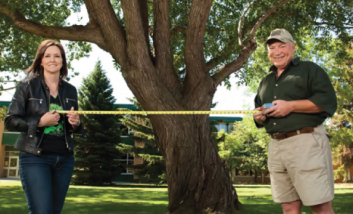
Green is the colour of choice at Lethbridge College these days: as a major employer, landowner and educator, the institution understands its responsibility to the community to be innovative and instructional in its promotion of sustainability.
However, as green comes in several shades, initiatives require co-ordination to be dynamic. Beginning this month, it will be the domain of Leona Rousseau and Dave McRae as Lethbridge College’s newly appointed Green Leadership Office (GLO) team, to help steer the campus towards a united approach in all it does.
“Society has an expectation that learning institutions will lead the way in sustainability,” says McRae, an instructor in the School of Environmental Sciences. “We want Lethbridge College to lead by example.”
Rousseau, program chair for the Interior Design program, agrees.
“Little bits are being done all over the campus,” she says. “We want to identify their champions and canvass their ideas and knowledge.”
The two educators have been seconded for the next six months to head Lethbridge College’s drive towards sustainability, but they are determined to not be confined by the term; they prefer “green leadership.” By June 30, they hope to complete three main inventories of green initiatives on campus, specifically, what’s being done in operations and facilities; in research and in the college curriculum. Their recommendations will follow on where Lethbridge College can go next.
The list they develop will include short- and long-term goals to show the community Lethbridge College is committed to practising and teaching “green,” and is eager to live up to last September’s signing of the Pan-Canadian Protocol for Sustainability developed by the Association of Canadian Community Colleges.
Seeding sustainability throughout the curriculum is vital to preparing grads for “green-collar” employment and imbuing them with a lifelong responsibility to the environment. Rousseau has been teaching sustainability in her Interior Design courses for eight years and is uncompromising in her beliefs. What she once encouraged students to merely consider in their careers she now makes mandatory practice.
“We must become a culture of sustainability, not just pay lip service to it. We want to go beyond merely maintaining the status quo. We want to become a clearinghouse for a co-ordinated effort and expose the good things being done to the rest of the college community.”
McRae too, is passionate about sustainability as someone who makes his living outdoors as field co-ordinator for the Conservation Enforcement program (Wider Horizons, fall 2008). He describes their roles in the GLO as coaches.
“You can’t win the Stanley Cup with a few great players,” he says. “You need an entire team; even the guy who books the flights is important. We want to acknowledge, celebrate and encourage those initiatives that work. Environmental responsibility is here to stay; you can either fight it or get on the bandwagon.”
The two realize Lethbridge College’s potential for community leadership.
“The college is a microcosm of the community. What we do on campus affects the entire city, from the way we handle waste and storm-water runoff to our recycling efforts. The better we handle these things, the more we’ll reduce our negative environmental impact on the city and save money doing it.”
Choosing Rousseau and McRae was, says Steven Dyck, executive director of Advancement, a way to communicate to the rest of the campus that green initiatives are not the purview of a single area.
“We require the support and co-operation of the entire campus to be successful,” says Dyck. “We’ve achieved several milestones so far. Now, with Leona’s and Dave’s involvement, we’ll have the co-ordination we require to r each the next level.”
A major piece of that next level is community education and outreach, again keeping with the college’s goal of providing sustainability leadership.
In the end, it comes down to the bottom line, or, in this case, a triple bottom line.
“A triple-bottom-line is a relatively new approach to institutional and corporate practice,” says Rousseau. “It takes into consideration three areas of institutional success, adding accountability and sustainability to the usual one of economics.
Economic cost is only one facet and ecological/environmental and social costs must now be inclusive for true sustainability.”
Steve MacRae advocates seven principles of xeriscaping:
1) planning
2) sod limitation
3) soil assessment & amendment
4) proper plant selection
5) appropriate watering
6) mulch application
7) proper maintenance
Some plants that are good for xeriscapes in Lethbridge are: Trees: hawthorn, limber pine, green ash, chokecherry
Shrubs: ninebark, juniper, sagebrush, mugo pine, cinquefoil
Perennial Flowers: blanket flower, wild bergamot, blazing star, pink pussy-toes
Grasses: blue grama, needle & thread, switch grass, junegrass, blue fescue


